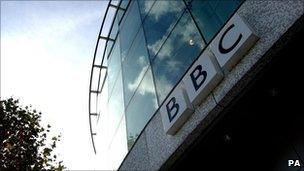Minister Jeremy Hunt says licence fee 'could be cut'
- Published

The television licence fee could be cut under the government's public spending austerity drive, Culture Secretary Jeremy Hunt has said.
In an interview with the Daily Telegraph, Mr Hunt attacked the BBC's "extraordinary and outrageous" waste.
He said he could "absolutely" see viewers paying less than the current £145.50 after next year's negotiations between the BBC and the government.
The BBC recently announced plans to cut its top managers' pay bill.
The aim is to reduce their pay by a quarter over 18 months.
The BBC Trust, which represents licence fee payers and governs the BBC, said that it was operating in a period of "severe austerity".
Jeremy Hunt said the BBC needed to recognise the "very constrained financial situation" the country is in.
He told the Telegraph the possibility of a reduction in the licence fee was a "discussion that we need to have".
'Tough decisions'
The culture secretary said: "The BBC should not interpret the fact that we haven't said anything about the way licence fee funds are used as an indication that we are happy about it. We will be having very tough discussions."
The Telegraph reported that a lower levy could be in place for 2012 following next year's review process.
The culture secretary said the BBC "will have to make tough decisions like everyone else".
"There are huge numbers of things that need to be changed at the BBC. They need to demonstrate the very constrained financial situation we are now in," he said.
But shadow culture secretary Ben Bradshaw said: "It's sensible for the level of the licence fee to reflect economic conditions and people's incomes and for the BBC to strive for better value for money.
"But this feels like part of a broader anti-BBC agenda.
"Most people value the BBC and Britain's tradition of public service broadcasting and would not favour damaging or destroying the BBC."
A Department of Culture spokesman said "no decisions about the level of the licence fee" would be taken ahead of the review process.
"Like all other public organisations, ministers expect the BBC to demonstrate that they are operating efficiently and giving value for money," he added.
Mr Hunt also revealed plans for the National Audit Office to examine the BBC's books.
Recent figures showed that BBC Director General Mark Thompson and the Executive Board's total pay packet had increased.
'The message'
Total remuneration for the BBC Executive board rose in 2009-10 to £4.769m from £4.601m in 2008/09.
And, overall, the number of BBC staff increased from 17,078 to 17,238.
But BBC media correspondent Torin Douglas said the BBC already "seems to have got the message" being spelt out by the culture secretary.
"In recent weeks, it's proposed a substantial reduction in pensions for many staff, agreed to cut its top managers' pay bill by a quarter over 18 months, and said it will publish the names of its highest-earning stars," he said.
Sir Michael Lyons, who chairs the BBC Trust, has outlined plans to cut pay, calling for greater transparency and saying every pound the BBC takes from licence fee-payers must be shown to have been spent well.
In a statement, the BBC Trust said: "The context in which the BBC is now operating is one of severe economic austerity.
"We have said that when we come to the next licence fee negotiations the trust will enter those talks representing licence fee payers' interests alone, and that we will seek only what is necessary for the BBC to fulfil its public purposes.
"The trust remains focused on the need to secure maximum value for money for licence fee payers."
- Published28 February 2010
- Published26 February 2010
- Published27 February 2010
- Published16 June 2009
- Published7 October 2009
- Published10 September 2009
- Published21 May 2009